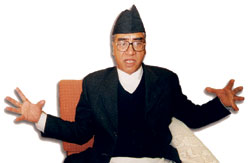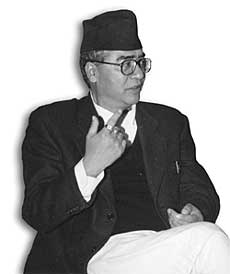With less than a month to go before the state of national emergency must be renewed by parliament, we spoke to Prime Minister Sher Bahadur Deuba about the counter-insurgency campaign, the cost of the war, the governance crisis, the standstill in development, and corruption in high places. Deuba explains why he can't reduce the size of his cabinet, and speaks about his rapport with King Gyanendra.
 Nepali Times: How long will the emergency last?
Nepali Times: How long will the emergency last?
Sher Bahadur Deuba: I cannot say. Terrorism can't be solved overnight. People are scared to give information, they are killing suspected informants. It could take longer to control terrorism, but an emergency cannot be stretched beyond one year. But the campaign is going well despite the difficult terrain and the lack of information. Things are improving.
Is a military solution possible?
I have always been for negotiations. I am a simple person, I believed (the Maoists) fully when they said they were for a negotiated solution. They wanted a constituent assembly, I told them I could not give that, but could organise a meeting to discuss it. I told them let's hold independent elections, you have a chance to win. Even if you don't, you will have some votes, which would favour a constituent assembly. But they betrayed me. In hindsight, it appears they were playing for time to regroup. But if they surrender their arms, I have no problems talking again.
Can the insurgency be solved without taking development to the people?
Development is needed, but without peace you can't begin development programs.
It seems to be a Catch-22. Without development there won't be peace, and there will be no peace without development.
I cannot say there will be peace if we have development, but what I can say now is that without peace we cannot have development. We are looking at a security shield so we can introduce poverty alleviation and employment generation, something like the ISDP.
The leader of the opposition tells us you're not keeping him informed about the security situation.
I have asked the secretaries of Defence and Home to brief opposition members at an all-party meeting. If they want the army chief to brief them, I am also ready to have him do it. There is nothing to hide, and we are not hiding anything. If we made mistakes we are willing to correct them. We have allowed the ICRC (International Committee of the Red Cross) to visit jails. But what can we do, the jails are crowded and we don't have money to build bigger jails and detention camps.
Money seems to be a major issue. What do you plan to tell donors at the Nepal Development Forum meeting next week?
Our main agenda at the meeting is poverty alleviation. We hope donors will make some pledges. The meeting is taking place in Nepal for the first time, and we are doing all we can to assure donors that we are serious about tackling poverty head-on. Nepal is in deep crisis, and that is a fact. We have to control terrorists, and at the same time we have to eliminate poverty and unemployment, which are breeding grounds for terrorists. We need education, health care, drinking water, roads, we need to modernise agriculture.
The donors probably agree with you on all these, but their main concern is implementation.
I agree that the implementation side is very poor. I am willing to take special measures to ensure that things work. I have already started looking into progress reports of donor-supported projects. I am monitoring them monthly, and am willing to do that every 15 days if that will help. I am willing to leave other work, and prioritise development monitoring. That is our main concern, we want to show results.
I am also working on forming a Commission on Women and getting the women's bill through the Upper House. There will be a foundation to handle the issues facing janajatis, we are ready to implement programs for uplifting the situation of dalits. On land reform, I had prepared an eight-point program but was not able to convince the party. But even with the 11 bigha limit, there will be some results. On socio-economic programs, I am telling opposition parties let us have a consensus on what can be done and announce the programs jointly.
I am ready to do anything to make the poverty alleviation mechanism work. Even if that needs putting the entire implementation mechanism under the United Nations system. UNDP could help coordinate it, or we can find 10 or 20 dedicated professionals in Nepal. I don't want more bureaucratic hurdles in Singha Darbar, but a mechanism to take development directly to the people.
 We know what has worked. We know decentralisation is the most direct way of doing that.
We know what has worked. We know decentralisation is the most direct way of doing that.
I believe fully in decentralisation, and I had in the past tried to give as much power as possible to local units, but my government was toppled. This time, I am determined to devolve powers to local government units.
But you have just slashed the VDC and DDC allocations by a quarter.
We had no choice. Besides, very little development activity is possible in the villages now because of Maoist activities.
But couldn't you have saved money trimming your cabinet instead of taking money meant for the grassroots?
Yes. That is also a possibility, I am holding consultations.
So you're cutting cabinet size?
I cannot say for sure. Let me first consult the party.
What if the party instructs you to downsize the cabinet?
Look, I cannot tell anything to the press now because there is a chance that I may be misquoted as has happened some time back. The cabinet size is a political compulsion.
You have to keep them in the cabinet so they won't rebel?
I don't want to comment on that now. But I am ready to cut costs of government.
But you also raised taxes to pay for security.
I didn't have a choice. It was either fight them, or surrender.
There is reluctance among donors to bankroll security. How are you going to pay for it?
We have been discussing support and I have been assured of help. Donors cannot directly give money to the army but they can help in other ways. Our cause is also being presented to the US Congress. The United States has promised non-lethal support, training, and communication equipment.
But Colin Powell's main concerns were governance, corruption control and human rights.
We are working with our partners to improve governance. I am bringing a strong anti-corruption control bill in parliament. You know what happened the last time we were discussing the anti-corruption act, there was a tussle between parliament and the judiciary. Democracy is messy, it takes time to get things done.
On human rights.
I have allowed the ICRC to visit jails, I have told human rights organisations they can also visit conflict areas. We are implementing humanitarian law according to the Geneva Convention. We say there should be no extra-judicial killings. We are ready to correct our mistakes if there have been any. But we cannot speak for the other side.
What about investor confidence and efforts to check capital flight?
I have told the business community I am willing to do anything to help. For investment, I will bring a law that will enable us to give infrastructure projects to the private sector under BOT (build-operate-transfer) contracts. This time we will introduce some good, new laws. It is painful, but we are also trying to sell off sick public enterprises.
How will you tackle the unemployment that will result from that?
We will give employees a golden handshake, we don't have a choice. We have been suffering huge annual losses. Two major banks are in trouble and have been unable to recover billions from defaulters. We are handing them over on management contracts. Royal Nepal Airlines is in the red. I have asked the RNAC to come with a viable proposal if they need government support. Otherwise there is no point putting good money after bad.
Couldn't you have waited for parliament to raise taxes, why use an ordinance?
We needed spending money, under the law we cannot divert expenses from other budget lines. We needed money immediately and had no choice.
You invited King Gyanendra to dinner in Baluwatar last week. How is your rapport with His Majesty?
We have a good rapport. We had a very frank, heart-to-heart talk. He spoke about corruption control, good governance, and economic, social and political reforms. His Majesty wants things to improve, he wants to see the country moving forward. I am trying to take some decisions to make sure that things move faster, you'll see some decisions soon. If only we could ensure greater efficiency, but in every government office there is dilly-dallying.
Why not start with senior ministers who are said to be corrupt?
Anything can be said about ministers, I hear some of them have taken money on civil service transfers. But we have not had any big contracts, so there has not been an opportunity for major corruption. But when the project contracts come, I will be watching closely. I will not let anyone take money on large contracts.
Does that mean small-time pickings are okay?
I cannot believe that my ministers have taken money on transfers. It could just be allegations. It is difficult to believe whatever appears in the papers. What I am saying is that if there have been payoffs on transfers then it's not major. I am strengthening the Commission for the Investigation of Abuse of Authority, I am also watching, you in the media should also keep a close watch. I won't let anyone get away with corruption.


